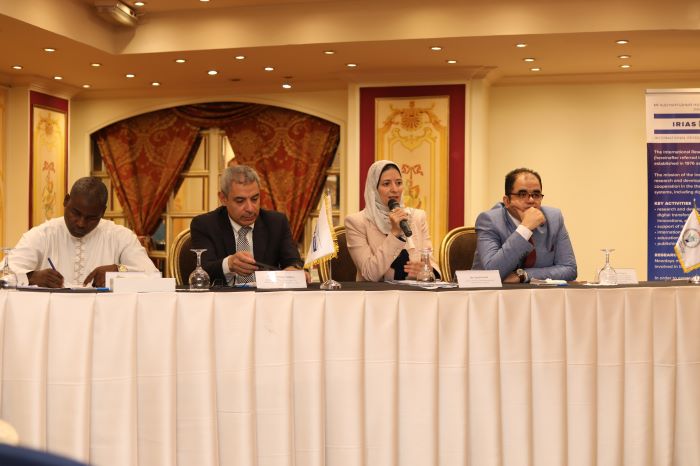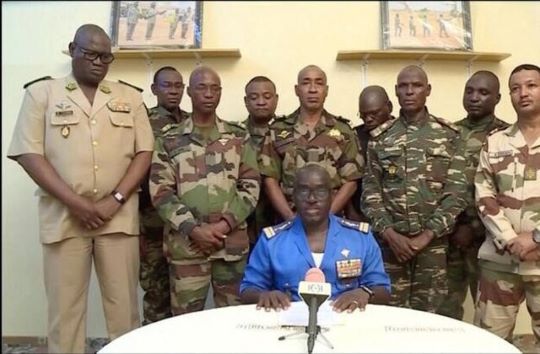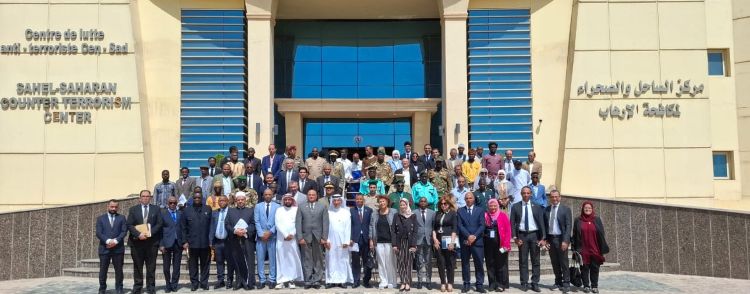
The African Center for Research and Strategic Studies (ACRESS), in collaboration with the International Research Institute for Advanced Systems (IRIAS) in Moscow, held a symposium titled "The Impact of Western Influence on Development and Economy in the Sahel Region" on Sunday, August 25, at Pyramisa Hotel in Cairo. The symposium was attended by a large number of diplomats representing African countries in Egypt, including the embassies of Niger, Burkina Faso, Liberia, Tanzania, Cameroon, Mauritania, Russia, and the United States, as well as Professor Dr. Tarek Wafiq, former Minister of Housing and Urban Communities. The event was also attended by representatives from the Chadian Youth Association for Social and Economic Development (AJDST) in N'Djamena, Chad, along with professors and experts specializing in African affairs, political science, economics, and African linguistics from Egyptian and Sudanese universities.
The symposium also attracted leaders of African communities and students enrolled in Egyptian institutions from countries such as Benin, Mali, Niger, Cameroon, Côte d'Ivoire, Comoros, Burkina Faso, Chad, Gambia, Guinea-Conakry, Mauritania, Senegal and Sudan. Additionally, master's and doctoral researchers interested in African affairs from various Egyptian universities attended the event. Various media outlets, including broadcast, visual, and electronic media, covered the symposium both in Egypt and abroad.
The symposium lasted for four hours, divided into three sessions, focusing on the issue of monetary subordination in the Sahel countries and the impact of the CFA franc on economic growth and development. The potential role of Russia in the development of the Sahel region was also discussed. The symposium featured speakers and experts from different African countries as well as from Russia. Dr. Ghada Fouad, Director of the African Center for Research and Strategic Studies (ACRESS), emphasized the importance of discussing these issues at this critical time, as the region is undergoing rapid changes with new ruling regimes eager to break free from monetary subordination and the dominance of financial and monetary policies in the Sahel countries. Professor Dr. Alexander I. Ageev, Director General of the International Research Institute for Advanced Systems (IRIAS) in Moscow, highlighted the many promising opportunities in the Sahel region due to the advanced technologies currently available. However, the biggest challenge still lies in obtaining financing, as the world faces a fundamental issue of international financing related to inequality. He stressed the need for new development banks based on multipolarity, as well as the creation of new payment systems.
Professor Dr. Mohamed Ashour, Professor of Political Science at the Faculty of African Postgraduate Studies at Cairo University, noted that those who control the flow of money within African countries can influence the paths of development in the region. He also pointed out that the current problems facing African countries stem from three curses they have been grappling with since independence: The curse of the borders inherited by African countries required them to operate within the constraints of those borders, which often were inadequate for enabling the ruling systems to fulfill the political, social, and economic functions of the new independent state. A boundary that served a colony might not meet the needs of an independent nation that must provide for its people, which brings us to another curse; the curse of resources, whether in abundance or scarcity, where resource-poor countries were unable to fulfill their obligations or perform the traditional functions of the state that serve its people (the functions of inducement and deterrence); and the curse of cronyism and corruption, where, in the face of resource scarcity and mismanagement, resources were distributed to those closest to power. This led to the government becoming a prize for those in power, fueling power struggles. Professor Dr. Jonathan Areemu, Professor of International Economic Relations from Nigeria and an expert in ECOWAS, emphasized that Africa is an important economic partner. He mentioned that they African countries implemented many policies for unity among them, and that “Russia is a significant player in terms of influence. Therefore, it is crucial to strengthen cooperation with Russia, but it is even more important to first unify and agree on issuing a single currency. This is vital as ECOWAS and Africa as a whole face common problems, such as public debt, inflation, and monetary subordination in Central and West Africa. True progress and development cannot occur without overcoming the colonial policies that have hindered the region, which is what ECOWAS is currently striving to do. Additionally, the assimilation and integration policies implemented by the former colonizers to foster loyalty among Africans to their former colonial powers continue to significantly impact the economies of our countries, and we need to change this. Therefore, African countries must work together.
We must act as independent countries, free to engage and cooperate with countries outside the continent in accordance with the rights enshrined in the United Nations Charter. Cooperation with Russia could help us achieve our developmental goals if we first organize ourselves in a framework of collaboration among African countries, as Russia has extensive experience in various fields.”
The first session of the symposium discussed monetary subordination in the Sahel through a research paper presented by Mr. Mohamed Al-Tamawi, a board member of the African Information and Consultations Center at Cairo University. The researcher analyzed the impact of the CFA franc on the economies and development of the Sahel countries, highlighting how it is a major obstacle to investment and gives a competitive advantage to foreign products at the expense of local products in both the Sahel and international markets. Another topic discussed in the session was the impact of colonial policy on the current governmental administrative structure in the Sahel, using Niger and Burkina Faso as case studies. Mr. Siaka Coulibaly, a political analyst from Burkina Faso, explained that the Sahel countries experienced various forms of subordination due to French colonization, including economic and military subordination. Now, in the confederation established between Mali, Niger, and Burkina Faso, they are striving to end this subordination and address the deep-rooted problems from the colonial era, as these issues continue to affect governance in the region today. French influence and control persist, but with the difference that after independence, French nationals were replaced by local elites loyal to them to maintain control over the people and ensure that resources remained in service of their interests. These elites, installed by the colonizers, have allied with informal armed groups and external networks of interest, whose primary goal is to halt any development or progress we attempt to make in our countries. Now, we are seeking to diversify our international relations network under the new leadership of our countries to escape this dominance. We have pursued strategic partnerships with Russia and India to find genuine partners who can assist our countries in their development and economic growth plans. Meanwhile, Mr. Aboubakar Elhaj Mehmen, head of the Nigerien community, emphasized that centralization in government administrative bodies, lack of power and task distribution, and discrimination among citizens in education and government appointments had been and continue to be major reasons for the inability of the Sahel countries, including Niger, to improve the efficiency of their government administrative systems. Moreover, the governments' inability to fulfill their obligations to their citizens, particularly in government appointments and services, had created a significant gap and a crisis of trust between these governments and their citizens. Politics and party membership had become a means of quick financial gain and increased influence through power, which was why it was essential to reconsider the nature of political practice in Niger—whether it was truly for the benefit of the citizen or for personal interests.
The second session addressed the impact of colonial policies on governance and administration in Chad through a speech by Mr. Ismail Taher, a researcher in African affairs at the University of N'Djamena. He asserted that most of the conflicts and disputes in the Sahel region were not merely ethnic conflicts, as Western researchers portray them, but rather power struggles among groups within society aimed at gaining more political advantages and strengthening their authority. Dr. Ahmed Yacoub Dabio, an expert in conflict resolution and head of the Center for Development Studies and Prevention of Extremism in Chad, discussed the impact of colonial policies on administrative and educational institutions and their relationship with the growth of extremism in the Lake Chad region. He noted that the number of victims currently falling due to terrorism is much lower than the number of victims during the French presence in the Sahel region in the colonial era. Therefore, we must continue to combat extremism not only through military means but also through intellectual confrontation and the correction of misconceptions. Most importantly, we must reintegrate and rehabilitate those returning from extremist movements into society, as this was one of the most serious issues currently facing our countries. Finally, researcher Mr. Omar Ahmed Al-Bustangi from Jordan, an economist, writer, and PhD candidate in Economics at the Faculty of Economics and Political Science at Cairo University, discussed the anticipated Russian role in the development of the Sahel region, considering the mutual benefits and economic challenges. He presented a comprehensive analysis of potential investment opportunities in Mali, Burkina Faso, Niger, Mauritania, and Chad, according to various sectors and the priorities of these opportunities in line with the needs of each Sahel country.
The symposium concluded with several important recommendations for addressing the issues related to monetary subordination and the negative impact of colonial policies on government administration in the Sahel region. It is worth noting that a report will be published by the seminar organizers, including all the papers and research discussed during the symposium.
This symposium was part of the implementation of the cooperation protocol between the African Center for Research and Strategic Studies (ACRESS) and the International Research Institute for Advanced Systems (IRIAS) in Moscow.
 ar
ar
 fr
fr


